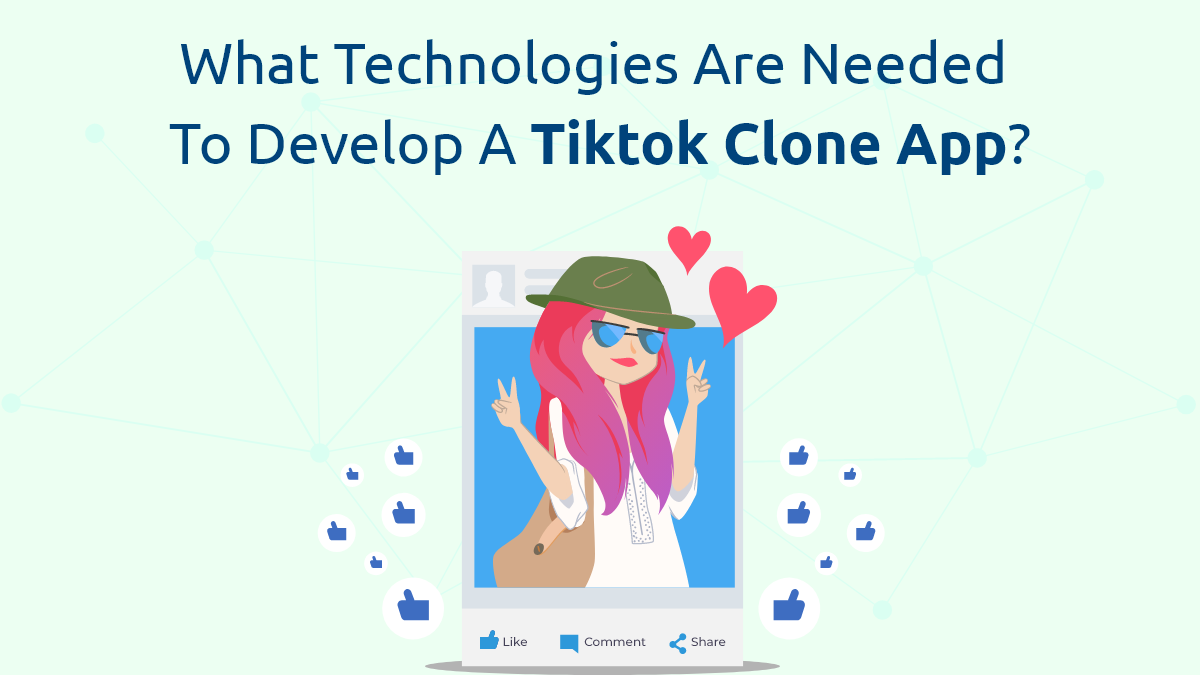Developing a TikTok clone app requires a robust technological foundation to replicate its key features and ensure a seamless user experience. Here’s a comprehensive guide to the essential technologies needed to build a TikTok clone app.
1. Cross-Platform Development Frameworks
To reach a wide audience efficiently, consider using cross-platform development frameworks that allow you to build and deploy your app on both iOS and Android platforms with a single codebase. Popular frameworks include:
- React Native: Developed by Facebook, React Native enables building native apps using React and JavaScript. It offers fast development cycles and allows for code reuse across platforms.
- Flutter: Developed by Google, Flutter is a UI toolkit that enables the development of natively compiled apps for mobile, web, and desktop from a single codebase. It provides a rich set of customizable widgets and fast rendering.
2. Backend Development
The backend of your TikTok clone app is crucial for handling user data, video uploads, interactions, and content delivery. Key technologies and considerations include:
- Node.js: A lightweight and efficient JavaScript runtime environment that is ideal for building scalable and real-time applications. Node.js is well-suited for handling concurrent requests and managing data streams.
- Firebase: A comprehensive platform by Google that provides backend services such as real-time databases, authentication, cloud storage, and hosting. Firebase is suitable for rapid prototyping and scaling apps quickly.
- Ruby on Rails: Known for its simplicity and productivity, Ruby on Rails (RoR) is a robust framework for building backend APIs. It offers built-in features for database management, routing, and scaffolding.
3. Database Management
Efficient data storage and management are essential for storing user profiles, videos, comments, and other app data. Consider using:
- Firebase Realtime Database: A NoSQL cloud database that provides real-time synchronization and offline data persistence for mobile apps. It stores data as JSON and synchronizes it across all connected devices in real-time.
- MongoDB: A popular NoSQL database known for its flexibility and scalability. MongoDB is suitable for storing large volumes of unstructured data, such as user-generated content (UGC) and media files.
4. Cloud Services
Utilize cloud services to ensure scalability, reliability, and efficient data management:
- Amazon Web Services (AWS): Offers a wide range of cloud services, including compute power, storage, databases, and content delivery. AWS provides scalability and high availability for handling varying levels of app traffic.
- Google Cloud Platform (GCP): Provides cloud computing services that offer computing power, data storage, and machine learning capabilities. GCP is known for its robust infrastructure and integration with Google services.
5. Media Streaming and Storage
Given that video content is central to a TikTok clone app, choose reliable solutions for media streaming and storage:
- Amazon S3 (Simple Storage Service): An object storage service that offers scalable storage for large volumes of data, including videos and multimedia content. S3 ensures high availability and durability of stored objects.
- Google Cloud Storage: A scalable and secure object storage service that provides efficient storage for videos, images, and other multimedia content. It offers global accessibility and integration with other Google Cloud services.
6. Video Processing and Transcoding
Implement tools for video processing, editing, and transcoding to ensure optimal playback quality and compatibility across devices:
- FFmpeg: A powerful multimedia framework for handling video, audio, and other multimedia files. FFmpeg supports various codecs and formats, making it suitable for video processing tasks like transcoding and editing.
- Zencoder: A cloud-based video encoding service that simplifies the process of transcoding videos into different formats and resolutions. Zencoder offers scalability and support for high-definition (HD) video encoding.
7. Authentication and Security
Implement robust authentication mechanisms and security protocols to protect user data and ensure secure access to the app:
- OAuth: An open standard for access delegation that allows users to grant third-party applications limited access to their resources without sharing credentials. OAuth facilitates secure authentication and authorization.
- JWT (JSON Web Tokens): A compact and URL-safe token format that securely transmits information between parties as a JSON object. JWTs are used for authentication and authorization in web and mobile applications.
8. Analytics and Monitoring
Integrate analytics tools to track user behavior, app performance, and engagement metrics:
- Google Analytics for Mobile Apps: Provides insights into user interactions, demographics, and app usage patterns. Google Analytics helps optimize user acquisition and retention strategies based on data-driven insights.
- Firebase Analytics: A free app measurement solution that provides comprehensive analytics for mobile apps. Firebase Analytics tracks user engagement, retention, and conversion metrics to optimize app performance.
Conclusion
Developing a TikTok clone app requires a strategic selection of technologies that support video recording and editing, backend management, database storage, cloud services, media streaming, authentication, security, analytics, and monitoring. By leveraging cross-platform development frameworks, scalable backend solutions, cloud services, and specialized tools for video processing and authentication, you can build a robust and feature-rich app that delivers a seamless user experience and attracts a loyal user base.
Stay updated with emerging technologies and industry best practices to continuously enhance your app’s performance, security, and user engagement. With careful planning and implementation of the right technologies, your TikTok clone app can thrive in the competitive landscape of social media platforms.

